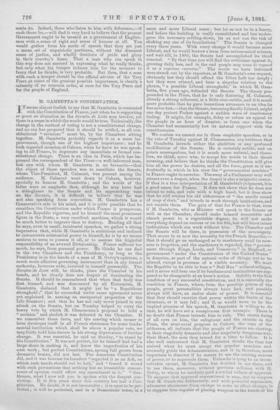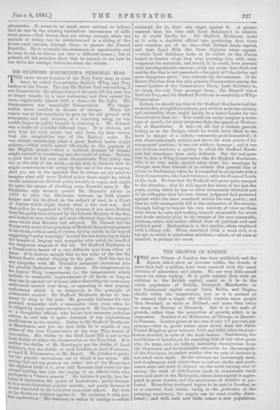M. GAMBETTA'S CONSERVATISM.
IT seems almost foolish to say that M. Gambetta is contented with the Constitution of France, just when he is supporting so great an alteration as the Scrutin de Lisle may involve, yet there is a sense in which the words would be true. Technically, the change in the method of voting is not a constitutional change, and no one has proposed that it should be settled, as all con- stitutional " revisions" must be, by the Chambers sitting together. M. Gambetta probably regards it as a mere im- provement, though one of the highest importance ; and he took repeated occasion at Cahors, when he knew he was speak- ing to all France, to deprecate any immediate or formal con- stitutional change. There is an idea in Paris, which has im- pressed the correspondent of the Times—a well-informed man, but one with whom M. Gambetta is no favourite—that the object of these speeches was to conciliate the Senate, whose Vice-President, M. Calmont, was present among the audience. M. Calmont went down to Cahors, however, specially to honour M. Gambetta ; and the words of the latter were so emphatic that, although he may have had a side-glance to the Senate and its approaching vote on the Scrutin, it is difficult to believe that ho was not also speaking from conviction. M. Gambettta has a Conservative side to his mind, and it is quite possible that he considers the Constitution under which Franco is prosperous, and the Republic vigorous, and he himself the most prominent figure in the State, a very excellent machine, which it would be much better to improve than to destroy. Reading all that he says, even in small, incidental speeches, we gather a strong impression that, while M. Gambetta is ambitious and inclined to concentrate substantial power in himself, he is by no means anxious to seem to possess it all, or to assume the frightful responsibility of an avowed Dictatorship. France suffered too much, he says, from personal power. He thinks he can find in the two Chambers and the Presidency, so long as the Presidency is in the hands of a man of M. Grevy's opinions, a much more effective governing instrument than in any formal authority, however wide, invested in himself personally. The Scrutin de Lisle will, he thinks, place the Chamber in his hands, and he clearly does not despair of dominating the Senate. It should be remembered that when that body was first framed, and was denounced by all Extremists, M. Garabetta, declared that it might yet be "a Republican stronghold ;" that he succeeded under some agreement never yet explained in naming an unexpected proportion of the Life Senators ; and that he has not only never joined in any attack on the Senate, but on Tuesday helped to carry the heavy vote by which M. Clemenceau's proposal to hold a " revision " and abolish it was defeated in the Chamber. If we remember these facts, and the craving which sooner or later developes itself in all French statesmen for some funda- mental institution which shall be above a popular vote, we may fairly hold him sincere in his strong deprecation of further change. It was essential, he said on Sunday, "to stand by the Constitution." It was not perfect, for he himself had had a large share in making it, and knew the imperfection of his own work ; but perfect Constitutions, sprung full grown from dreamers' brains, did not last. The American Constitution did, and it was because its founders " regarded it as an Ark, on which rash hands should not be laid," and " fenced it round with such precautions that nothing but an irresistible concur- rence of opinion could effect any amendment in it." " Gen- tlemen, what I now tell you is spoken with the deepest con- viction. It is five years since this country has had a Con- stitution, No doubt, it is not immutable ; it is open to be per- fected ; it will be perfected, and in a Democratic sense, in a more and more Liberal sense ; but let us not be in a hurry, and before the building is really consolidated and has under- gone the necessary settling-down, let us not run the risk of shaking any one of its foundations." The Senate is changed every three years. With every change it would become more Liberal, and he would borrow a term from astronomical science, and wait till, in 1885, the Senate had accomplished its third renewal, " By that time you will find the criticisms against it, growing daily less, and in the end people may come to regard it as a supreme resource." The words we have italicised were struck out by the reporters, at M. Gambetta's own request, obviously lest they should offend the Ultra Left too deeply ; but they were uttered, and bear a singular relation to the phrase, " a possible Liberal stronghold," in which M. Gam- betta, five years ago, defended the Senate. The theory pro- pounded in the Times, that he is only flattering M. Calmont, already a strong adherent, is a little over-subtle, and it is much more probable that he gave incautious utterance to an idea he has never lost,—that the Senate, becoming fixedly Liberal, might one day protect France against a sudden wave of reactionary feeling. It might, for example, delay or refuse an appeal to the people in an hour of disaster, or force one when the Chamber had momentarily lost its natural rapport with the constituencies.
We confess we cannot see in these emphatic speeches, or in the vote of Tuesday against M. Clemenceau, any evidence that M. Gambetta intends either the abolition or any profound modification of the Senate. He is certainly subtle, and on points unscrupulous, but it is much more natural, and there- fore, we think, more wise, to accept his words in their direct meaning, and believe that he thinks the Constitution will give him all the power ho desires, and all the force, great as it un- doubtedly is, which in his view the " governmental machine " in France ought to exercise, The sway of a Parliament may well attract even a despot, when the despot is also a magnetic orator. If that is a true interpretation of M. Gambetta's judgment, it is a good omen for France. It does not show that he does not intend to rule, and rule with a high hand, but it does show that he still retains his old abhorrence of " the sterile round of coup deletes," and intends to work through institutions, and not outside them. The gain of that for Franco is that, even if M. Gambetta, who as Minister will speak in the Senate as well as the Chamber, should make himself irresistible and absorb power to a regrettable degree, he will not make everything depend on success or on his life, but will leave intact institutions which can work without him. The Chamber and the Senate will be there, in possession of the sovereignty. That seems to us now the necessity for the French Republic,— that it should go on unchanged as to machinery until its new- ness is forgotten, and the machinery is regarded, like " govern- ment through Kings, Lords, and Commons" in England, or government " under the Constitution of the United States " in America, as part of the natural order of things, not to be altered, except in presence of a visible necessity. We want the Republic to be able to bear a " Bull Run " without collapse,
and it never will bear one if its fundamental institutions are sup- posed to be changeable at an hour's notice. Solidity is the first condition of any successful constitution, and it is especially the condition in France, where, from the peculiar genius of the people, great personalities always have had, and possibly always will have, an undue share of power. It is essential
that they should exercise that power within the limits of the structure, or it may fall ; and if, as would seem to be the
implied promise of his speech, M. Gambetta is willing to do
that, he wilt have set a conspicuous first example. There is no doubt that France intends him to rule. The recent fixing
of all eyes on him, the oulogiums and the attacks in the Press, the semi-royal progress to Cahors, the tone of the addresses, all indicate that the people of France are electing, in their singularly dramatic and also singularly dangerous way, their Head, the man they intend for a time to follow. It is also well understood that M. Gambetta thinks the time has arrived when he must accept the popular mandate and avowedly guide the Administration, and it is, therefore, most important to discover if he means to use the existing sources
of power, or to supersede them. Unless ho is lying to an incon-
ceivable extent, M. Gambetta has cl-icided to use them, and to use them, moreover, without previous collision with M. Gr4vy, to whom ho carefully paid a cordial tribute of approval. To suppose that approval conventional is easy, but to suppose that M. Gambetta deliberately, and with powerful arguments, advocates abstinence from change in order to effect change, is to suppose him capable of placing weapons in the hands of his adversaries. It seems to us much more rational to believe that he sees in the existing institutions instruments of suffi- cient power—God knows, they are strong enough, when the method of voting can be revolutionised in a sitting of five hours—and intends, through them, to govern the French Republic. He is avowedly the statesman of opportunity, and he may be led or driven yet into a different course ; but at present, all his promises show that he intends to see how he can drive the carriage, before ho alters the wheels.



































 Previous page
Previous page